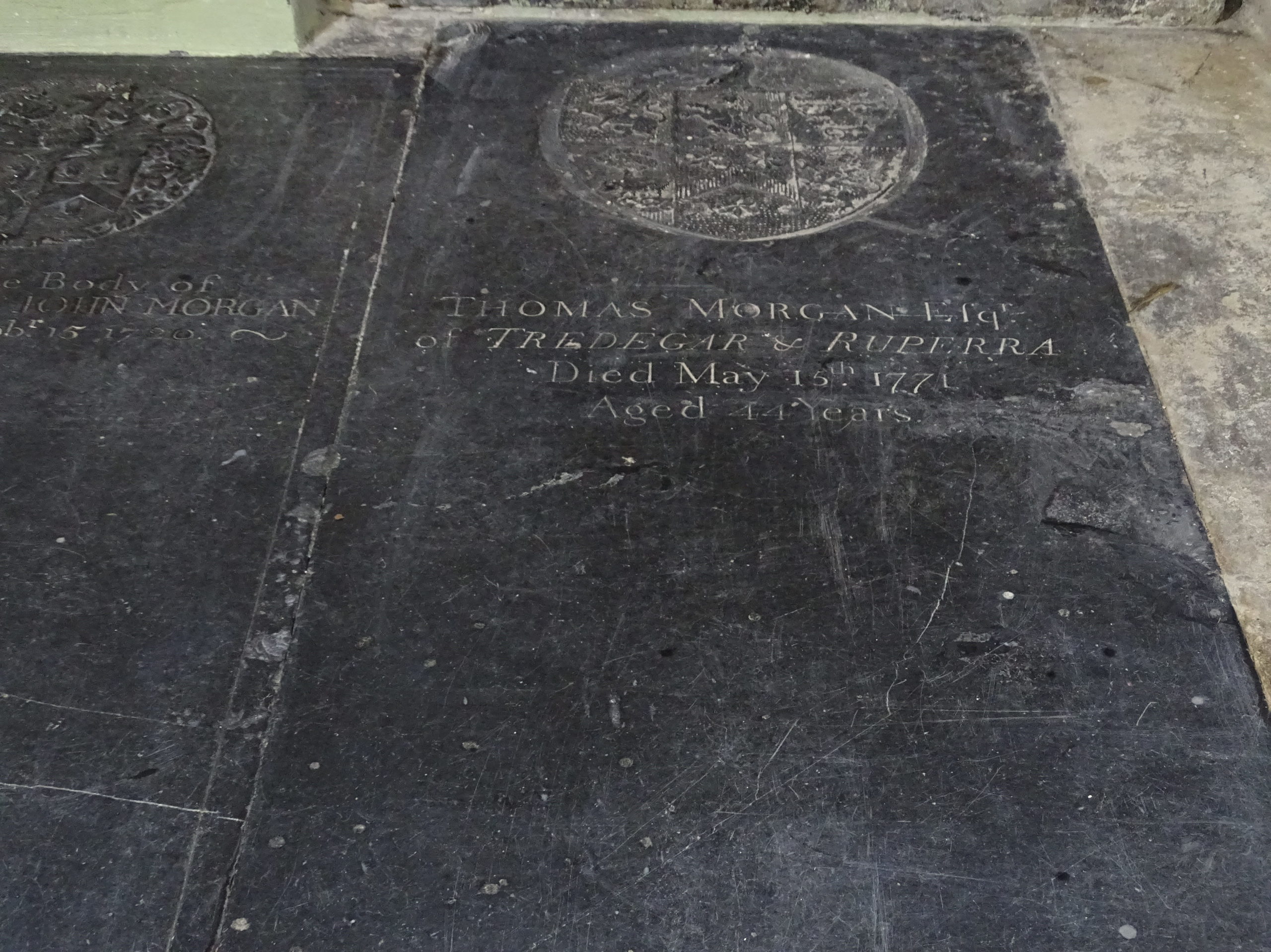Ledger 1: ‘Colonel’ Thomas Morgan
8th June1727 – 15th 1771
Died aged 43
Thomas Morgan of Tredegar and Ruperra is buried in the grave furthest east in the northerly row of ledgers in the chapel. It is marked with a large black ledger slab with low relief carved shield to the head and the inscription commemorates his death on 15th May 1771 The material is a polishable crystalline limestone. There is no other memorial for Thomas in the church, though there is a large hatchment in the nave.

He was the eldest son of Thomas Morgan and Jane Morgan (nee Colchester) and brother of Charles Morgan (d.1787) and John Morgan (d.1792) and was known as “Colonel” due to his rank in the Monmouthshire militia.
With his father’s death in 1769, Thomas inherited both the Tredegar and Rhiwperra Estates. However, his tenure was only just over two years and he made little impact on the history of these great Estates.
Like so many of his family, he was a Member of Parliament. Apparently, he never spoke in the House and his only known vote was in 1768.
He represented Brecon in the House of Commons from 1754 until 1763 when he accepted the ”Stewardship of the Manor of Old Shoreham”. This improbably named appointment is a legal fiction acting to release MPs from their seats because technically they were not permitted to resign from Parliament. In taking this appointment Thomas became an officer of the crown which automatically disqualified him from being a Member of Parliament.
His release from the Brecon seat enabled him to succeed his late cousin, Sir William Morgan as MP for Monmouthshire, a safe seat for the Morgans. He then represented the county from 1763 until he died in 1771.
He was briefly Lord Lieutenant of Brecknockshire and Monmouthshire, succeeding his father which the Stamford Mercury of Thursday 25th January 1770 quaintly reported –
“On Wednesday last Thomas Morgan, Esq; Member for the county of Monmouth, kissed his Majesty’s hand, on being appointed Lord Lieutenant and Custos Rotulorum for the Counties of Monmouth and Brecon.”
Thomas in his short life seems to have made little impact on history even though he held public office in Parliament and was the King’s representative for two counties. In December 1769 he did, however, have his “day in court”, though it more than probable that he did not attend in person. As reported in the Leeds Intelligencer on 19th December 1769 –
“Friday last came on to be heard, before the Lord High Chancellor, in Lincoln’s- Inn-Hall, a cause of great consequence, relating to the Tredegar estate, in South-Wales, reputed to be of the improved value of £12,000 per annum, between Thomas Morgan, Esq. Knight of the shire for the county of Monmouth, nephew and devisee in the will of the late Sir William Morgan, of Tredegar, Knight of the Bath, and William Jones, Esq in Right of his Lady, who is the only surviving child and heir at law of the said Sir William Morgan, by Lady Cavendish, eldest daughter William Duke Devonshire, and heir general of the family. Mr. Morgan contends, that the whole estate is, by the said will, effectually given to him. Mr. and Mrs. Jones contend, that the said will is absolutely void, as to the disposition the whole estate, which was settled on Sir William Morgan’s marriage; and that, should the freehold estate be decreed against the heir at law, that she is, all events, entitled to the customary-hold estates, which were alleged to be very great value. After the cause was opened by Mr. Morgan’s council, and the will read, as the question appeared to be merely a legal one, and on which so great a property depended, the court declared, that they would not determine it, but make a case of it for the opinion of the judges of the King’s bench, before whom it is soon to be argued; and directed the matter to make an enquiry in relation to the customary-hold estates.”
It seems fitting that even in the High Court the case against Thomas was inconclusive and was left to others to decide.
The post mortem which followed his death at the comparatively young age of 43 found that he died from liver disease. Thomas did not die at Tredegar and if anything, his funeral was even more lavish than his father’s, with his outer coffin being decorated with eight dozen brass ‘drops cased in silver’.
Thomas never married and left his estates (Rhiwperra Castle and Tredegar House) to Charles Morgan, his younger brother.